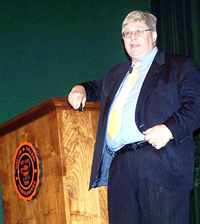 In a presentation liberally sprinkled with insights from a variety of historical figures, a noted ethicist urged a Tusculum College audience Thursday morning (Aug. 31) to “live a life that matters” and to “move beyond success into significance.”
In a presentation liberally sprinkled with insights from a variety of historical figures, a noted ethicist urged a Tusculum College audience Thursday morning (Aug. 31) to “live a life that matters” and to “move beyond success into significance.”
Michael Josephson, founder and president of Josephson Institute of Ethics and president of the CHARACTER COUNTS! Coalition was the guest speaker at the college’s opening convocation, officially launching the 2006-2007 academic year. Josephson, who has extensive media exposure as an ethical commentator, founded the institute that created the CHARACTER COUNTS! youth-education initiative that is used by character education public school programs across the State of Tennessee and elsewhere.
The Josephson Institute is overseen by a volunteer, independent Board of Governors. Josephson serves without salary as president of both the Institute and the CHARACTER COUNTS! Coalition, according to the Institute web site.
Josephson spoke in the Annie Hogan Byrd Fine Arts building auditorium to a crowd made up mostly of Tusculum College students, most of the Residential College faculty, and numerous college staff members and community figures. The First Tennessee Human Resources Agency, Tusculum College and Scott M. Niswonger supported the speaker’s visit. Tusculum College Museums Program Director George Collins was instrumental in bringing Josephson to the college.
Focusing his comments mostly toward students, Josephson said that the college years are a time of asking four questions: 1) what do you want to have? 2) what do you want to do? 3) who do you want to be with? and 3) who do you want to be? The last question is the most important of the four, he said, and how it is answered affects the answers to the other three.
He recounted the story of Alfred Nobel, a wealthy and successful industrialist who invented dynamite. Nobel, however, realized he was not happy with mere “success” after reading his own obituary, published by mistake in a newspaper. Seeing his life defined in the obituary as a string of successes, Nobel was distressed, Josephson said, and decided to “go beyond success to significance.” So he created the Nobel Peace Prize, which has led to the lasting association of the Nobel name not with dynamite, but with human betterment.
Josephson also discussed Albert Schweitzer, who forsook a life of wealth and luxury to become a medical missionary in impoverished parts of Africa, and Anne Frank, a Jewish girl forced to hide from the Nazis for years before finally being taken to a concentration camp, where she perished. Her famous diary contains insights showing wisdom beyond her years, Josephson said, including the quote: “The final forming of a person’s character lies in their own hands.”
Josephson cited a quote from a man whose experience paralleled parts of Anne Frank’s: psychologist and author Victor Frankl, who survived the concentration camps that killed the rest of his family. In his classic, “Man’s Search for Meaning,” Frankl wrote: “Everything can be taken from a man but …the last of the human freedoms – to choose one’s attitude in any given set of circumstances, to choose one’s own way.” Josephson quoted sources from several religious, cultural and moral traditions to drive home his points. He cited a Buddhist proverb: “Pain is inevitable; suffering is optional.”
He also presented several pieces of advice in his own words: “Stop whining. It gets you nothing and isn’t very attractive.” Also: “What we now call ‘pressures’ we used to call ”temptations.’ And we knew just what we were supposed to do about them.” He cited a modern cultural tendency to use the prevalence of a particular idea or practice as grounds for declaring it acceptable. This, he argued, is wrong in that it equates the “is” with the “ought.”
Cynics, he said, tend to “move the ‘ought’ toward the ‘is'” i.e., to justify actions as right because they are commonly done. The proper approach, he said, is to try to move the “is” toward the “ought” – to bring actual practice in line with what is right. “There’s a difference between what you have a right to do and what is right to do,” he said.
The inability of one individual to correct every wrong should not cause that individual to languish in doing what he or she can do, Josephson said. He quoted Edward Everett Hale: “I am only one; but still I am one. I cannot do everything, but still I can do something; I will not refuse to do something I can do.”
“Life is a strategic plan,” Josephson said. “And the goal of that plan is the eulogy you want to earn for yourself.” Saying he was going to “turn this convocation into an invocation,” Josephson said in conclusion: “I invoke you to live a life that matters.”
The Joseph & Edna Josephson Institute of Ethics is a public-benefit, nonprofit, nonpartisan and nonsectarian membership organization founded by Michael Josephson in honor of his parents. Since 1987, the Institute has conducted programs and workshops for over 100,000 influential leaders including legislators and mayors, high-ranking public executives, congressional staff, editors and reporters, senior corporate and nonprofit executives, judges and lawyers, and military and police officers.


